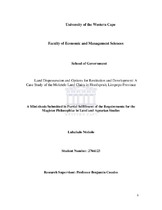| dc.contributor.advisor | Cousins, Benjamin | |
| dc.contributor.author | Ntsholo, Lubabalo | |
| dc.contributor.other | Programme for Land and Agrarian Studies | |
| dc.contributor.other | Faculty of Arts | |
| dc.date.accessioned | 2013-12-04T13:25:02Z | |
| dc.date.available | 2011/02/17 11:47 | |
| dc.date.available | 2011/02/17 | |
| dc.date.available | 2013-12-04T13:25:02Z | |
| dc.date.issued | 2009 | |
| dc.identifier.uri | http://hdl.handle.net/11394/2508 | |
| dc.description | Magister Philosophiae (Land and Agrarian Studies) - MPhil(LAS) | en_US |
| dc.description.abstract | The study adopted qualitative research methods because the issues to be researched are complex social matters. The approach was three-pronged. Firstly, a desktop assessment of the claim was done. Secondly, semi-structured interviews were conducted with selected households in the community to understand their experiences after dispossession and their perception of the restitution claim. Thirdly, a combination of desktop analysis and household interviews was employed to understand the socio-economic dynamics and evaluate the feasibility of the community's perceptions. | en_US |
| dc.language.iso | en | en_US |
| dc.publisher | University of the Western Cape | en_US |
| dc.subject | Land reform | en_US |
| dc.subject | Government policy | en_US |
| dc.subject | South Africa | en_US |
| dc.subject | Limpopo | en_US |
| dc.subject | Economic conditions | en_US |
| dc.title | Land dispossession and options for restitution and development: a case study of the Moletele Land Claim in Hoedspruit, Limpopo Province | en_US |
| dc.type | Thesis | en_US |
| dc.rights.holder | University of the Western Cape | en_US |
| dc.description.country | South Africa | |

